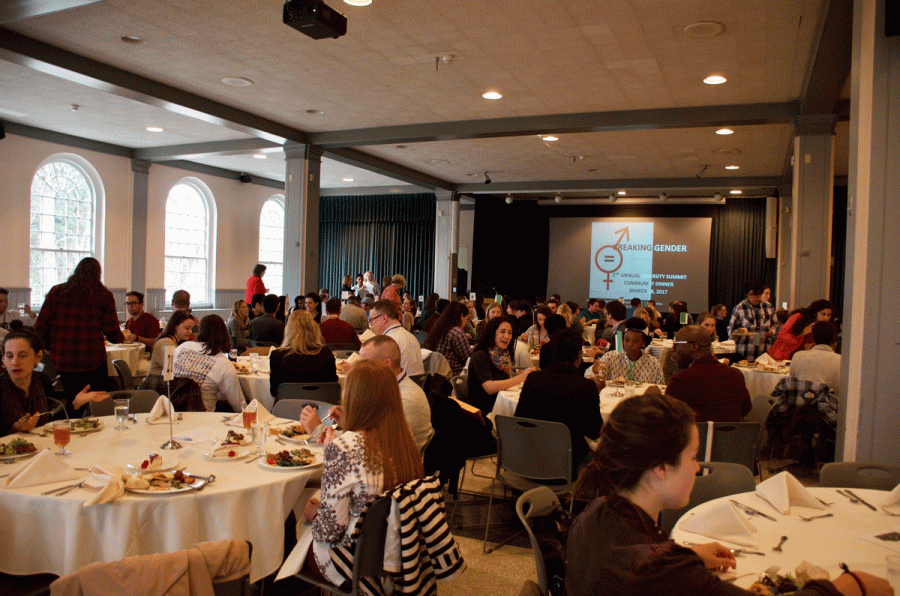Diversity Summit Community Dinner breaks new ground
March 30, 2017
Members of University community met in Larison Dining Hall on March 28 for the Second Annual Diversity Summit Community Dinner, which was sponsored in part by the University Alumni Association. The event was titled “Breaking Gender” and was attended by more than 150 individuals, including students, faculty, and staff members.
The event was facilitated by students Juan Alonso ’19, Kwaku Amponsah ’19, Maddie Galvez ’19, Jackson Pierce-Felker ’18, Reid Sanchez ’18, Tess Smith ’18, Sydney Whorral ’19, and Dechen Yangkyi ’17. Barry Jenkins, the Diversity Summit’s keynote speaker and director of the 2017 Academy Award Best Motion Picture Drama, “Moonlight,” was also in the audience.
While this dinner was part of a year-long series, it quickly became apparent that this event was different from past Community Dinners.
“This dinner, in particular, is designed to be experiential and participatory so that being there will be far different from reading about it,” event organizer and Director and Chief Curator of the Samek Art Gallery Richard Rinehart said. “The experimental aspect engages people in the topic in new ways.”
This hands-on experience was achieved through the use of a social experiment, modeled after teacher Jane Elliott’s “Blue-eyes Brown-eyes” exercise for her class of school children. Upon arriving to Larison Dining Hall, each guest was handed a lanyard with a colored tag on it. These tags were either green, blue, or red, and divided guests into three groups.
Those with red tags were asked to wait in the hallway while the green and blue groups got food and were seated. Members of the green group were also urged to move to the front of the food line, although many hesitated to do so.
After about 20 minutes of conversation aimed at getting to know your table, it was revealed that these groups represented different points on the gender spectrum: green for cisgender males, blue for cisgender females, and red for all other gender identities.
Throughout the event, individuals of different colored tags were treated with either respect or contempt and disregard by students planted at each table.
“Sometimes you don’t realize you’re experiencing these micro aggressions, or maybe we do realize it but we accept it, we put up with it… for women and non-gender binary it’s detrimental, but often we don’t speak up,” Diversity and Inclusion Fellow Carmen Henne-Ochoa said.
While some attendees realized that a social experiment was taking place, others either did not notice or were left uncomfortable and confused by the macroaggressions and blatant acts of sexism taking place.
“You got me,” Jenkins said. He stood up during the room-wide discussion portion of the event, wearing a green tag: a mark of the highest privilege. He said that while he was left uncomfortable by the odd and disrespectful behavior happening at his table, he did not intervene.
“When you have privilege, you should use that to protect the less privileged, and I did not,” Jenkins said. Many others echoed the same thought.
The event sparked thoughtful conversation, both at individual tables and among the entire group.
“I figured out pretty quickly what they were doing but not what the groups represented. I thought that it was really interesting to have such a visual display of the differences people face every day,” Emily Vislosky ’18 said.
Participants discussed the issues surrounding the current gender binary ingrained into campus culture, where these ideas actually come from, and how the University can initiate change as a community.
“Gender is one of the most relevant and important topics of debate of our time,” Rinehart said. “Discussions about and awareness of gender infuse our social lives and our political environment.”
Yangkyi said that a lot of hard work had gone into planning the event and that many University students could relate to the issues raised. She was optimistic about the effect the dinner would have on the school.
“Our Community Dinner creates a space not just for conversation, but also for reflection with some very thought-provoking activities and role plays,” Yangkyi said. “I think this event is going to leave an impact on many of the participants.”






















